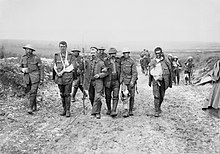Nelson's History of the War
Nelson's History of the War is a 24-part series work by the Scottish writer John Buchan , which deals with the First World War . The 24 volumes appeared at regular intervals between February 1915 and July 1919 by Thomas Nelson and Sons .
content
Buchan describes the events of the war, beginning with the attack on Franz Ferdinand von Österreich-Este in Sarajevo , and ends his work with the Paris Peace Conference in 1919 . In terms of design, Buchan's stories are prepared with illustrated land and war maps.
The work in its entirety is viewed as a propaganda narrative of the events of the First World War. Buchan was unable to join the war as he was bedridden with a duodenal ulcer shortly before the outbreak of the war . His participation in propaganda agencies and his dedication to the military success of Great Britain influenced his chauvinistic interpretations of the events of the First World War.
His writing of the Battle of the Somme shows Buchan's distorted image of reality particularly clearly. He describes the performance of the British soldiers in battle as "the merciless determination of the mighty figures":
"The British soldiers were quick to kindle in the fight, and more formidable figures than those bronzed, steel-hatted warriors history has never seen on a field of battle. Those who witnessed the charge of the Highlanders at Loos were not likely to forget its fierce resolution. "
In fact, on July 1, 1916, out of 110,000 of the English soldiers, over 70,000 were fatally injured or killed.
reception
Buchan's series was the first important historical treatise of the First World War in the English-speaking world. It was written during the war, when its outcome and consequences were still unknown.
Nonetheless, the book series was very popular shortly after it was first published. In May 1915, Buchan became one of five war correspondents for the British Army, writing for The Times and Daily News and Leader . He worked in high positions in the British propaganda authorities until the end of the war. In 1922 his post-war work A History of the Great War was published in 4 volumes. It should be a revised version of Nelson's History of the War .
Buchan's treatises of the war, however, were generally more criticized than praised. Today his works are often used to analyze British propaganda during the First World War.
David Lloyd George
Former Prime Minister David Lloyd George makes reference to A History of the Great War , in which Buchan describes his meeting with Robert Nivelle in Paris in 1917 . Lloyd George says Buchan reproduced the meeting with Neville in "an imaginative picture."
"When a brilliant novelist assumes the unaccustomed role of a historian it is inevitable that he should now and again forget that he is no longer writing fiction, but that he is engaged on a literary enterprise whose narration is limited in its scope by the rigid bounds of fact. "
According to Buchan, Lloyd George is said to have immediately agreed to and enthusiastic about Nivelle's plan to penetrate the western fronts within 48 hours and achieve victory.
Peter Buitenhuis
Peter Buitenhuis refers to Nelson's History of the War in his book The Great War of Words :
"His entire History of the War is a work of propaganda, consistently giving the most positive slant to news from all fronts of the war."
literature
- John Buchan: Memory Hold-The-Door. Musson Book Company Ltd., USA 1940, ISBN 978-1-131-15361-2 .
Web links
- Link to all 24 volumes on greatwarforum.org
Individual evidence
- ^ Nelson's History of the War Volume I. In: Faded Page. Retrieved February 15, 2019 .
- ^ Hew Strachan: John Buchan and the First World War: Fact into Fiction . In: Was in History . tape 16 , no. 3 , June 2009, ISSN 0968-3445 , p. 300 , doi : 10.1177 / 0968344509104194 ( sagepub.com [accessed February 15, 2019]).
- ↑ Keith Grieves: Nelson's History of the War . In: Journal of Contemporary History . tape 28 , no. 3 , July 1993, ISSN 0022-0094 , p. 533 , doi : 10.1177 / 002200949302800307 ( sagepub.com [accessed February 15, 2019]).
- ↑ John Buchan: Nelson's History of the War . tape 16; 1915-1919 . T. Nelson Publishers, London, pp. 45 ( archive.org [accessed February 15, 2019]).
- ^ Mathew Crampton: Propaganda in Action. In: No Glory in War 1914-1918. Retrieved February 15, 2019 .
- ^ Hew Strachan: John Buchan and the First World War: Fact into Fiction . In: Was in History . tape 16 , no. 3 , June 2009, ISSN 0968-3445 , p. 302 , doi : 10.1177 / 0968344509104194 ( sagepub.com [accessed February 15, 2019]).
- ^ Hew Strachan: John Buchan and the First World War: Fact into Fiction . In: Was in History . tape 16 , no. 3 , June 2009, ISSN 0968-3445 , p. 302 , doi : 10.1177 / 0968344509104194 ( sagepub.com [accessed February 15, 2019]).
- ↑ Carlton JH Hayes: Reviewed Work: A History of the Great War by John Buchan. In four volumes . In: The American Historical Review (Ed.): Oxford University Press . tape 29 , no. 1 , October 1923, ISSN 1937-5239 , p. 140 , doi : 10.1086 / ahr / 29.1.140 ( oup.com [accessed February 15, 2019]).
- ^ Hew Strachan: John Buchan and the First World War: Fact into Fiction . In: Was in History . tape 16 , no. 3 , June 2009, ISSN 0968-3445 , p. 299 , doi : 10.1177 / 0968344509104194 ( sagepub.com [accessed February 15, 2019]).
- ^ Peter Buitenhuis: The Great War of Words. Literature as Propaganda 1914-18 and After . Batsford, London 1989, ISBN 0-7134-6066-0 , pp. 92-93 .

